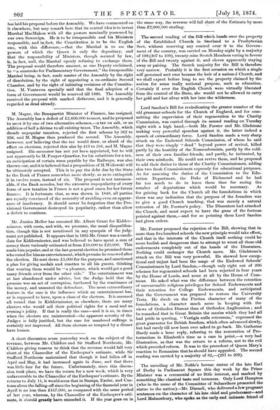Mr. Forster proposed the rejection of the Bill, showing that
in- more than five hundred schools the new principle would take effect, and that in the interests of the Church itself nothing could be more foolish and dangerous than to attempt to wrest all these old endowments completely out of the hands of the Dissenters. Nothing could endanger the Church more. Mr. Gladstone's attack on the Bill was very powerful. He showed how excep- tional and unjust had been the usage of the Endowed Schools' Commissioners by Lord Sandon,—though only eight out of 200 schemes for regenerated schools had been rejected in four years by the House of Lords, and none at all by the House of Com- mons. He asked what was the difference between the retention of unreasonable religious privileges for School Endowments and their retention for College Endowments, and anticipated that the Government was prepared to restore the University Tests. He dwelt on the Puritan character of many of the foundations, a character much more in keeping with the views of Orthodox Dissent than of Orthodox Anglicanism ; and he remarked that in Great Britain the maxim which they had all had pride in quoting, " Vestigia nulls retrorsum," expressed the great guarantee for British freedom, which often advanced slowly, but had rarely till now been ever asked to go back. Mr. Gathorne Hardy made a lame reply, referring to the restoration of Pro- testantism in Elizabeth's time as a case in point,—a very bad illustration, as that was the return to a reform, not to the evil which preceded reform. It was to the precedent of Queen Mary's reaction to Romanism that he should have appealed. The second reading was carried by a majority of 82,—(291 to 209).


































 Previous page
Previous page